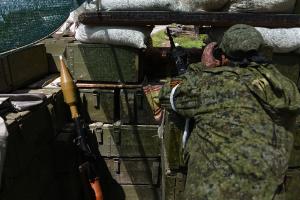
War is always an evil. No matter who wins, humanity loses. “And let us not forget that war and terrorism are always a great loss for all humanity. They are the great defeat of humanity!”[1] Even the most just war is an evil which we should pray we never have to face, but when war comes to us, not everyone is equally guilty for the evil which follows. Those who intend to take what is not theirs and make it their own, or those who intend to harm innocents because of various prejudices and biases they hold against those innocents, will face resistance. Those who are defending themselves from such violence have less culpability for what happens than those who turned them into resistors, but nonetheless, what happens in war, even if justified, can and will stain the souls of those involved. For peace to be restored there will need to be more than the cessation of hostilities, but restorative justice, as Cardinal Arinze said right after 9-11:
Justice is a necessary foundation for peace. If people are deprived of their rights, if they are oppressed and repressed, if they are not allowed to have a voice to claim what is due to them, then the foundations for peace and shaky indeed. [2]
Ukrainians have a right to desire peace, and after being unjustly invaded by Russia, that peace must mean Russia will not only have to cease hostilities but work to restore what was already lost to the Ukrainians. Putin’s desire for an empire does not justify the invasion of a sovereign country. There was no just cause for war. And so, we see, with Russia’s assault into Ukrainian territory, justice has been destroyed, and humanity once again suffers a great loss.
“Wisdom is better than weapons of war, but one sinner destroys much good” (Eccles. 9:18 RSV). We must pray for peace, meaning, for its restoration, and that of course means more than an end to the violence, but an end to the root causes which have led to the war, among which are pride, hatred, envy, and greed. “Let us then pursue what makes for peace and for mutual upbuilding” (Rom. 14:19 RSV). In the present circumstances, this means promoting and defending the rights of Ukrainians. We must seek an end to the violence, but to do that, we must look for more than the mere cessation of war, but actually promote justice, making sure that those who are guilty for the violence give back to the world the justice which they took from it.
Our desire for peace must be motivated by love. We should truly desire hostilities should be brought to end, and that means, looking after the needs of the Russians involved in the war. We must realize how many of them are being forced into the conflict and so care for and pray for them just as much as for the Ukrainians. This does not mean Russia will not be held responsible for the war. But we must realize how much of the war is the result of Putin’s desires, not the desires of the Russians people, and that they most of them are just as much the victims of Putin’s injustices as those in Ukraine.
No more war! That should always be our hope, and our cry. But when war comes, we must deal with it properly. We must realize it is an evil, and all sides in the war will be wounded by that evil. When the war is over, everyone will have to do their part to make for a lasting peace. But those who are the most culpable, those who have done the greatest evil in war, will have to make the greatest restitution. We should not treat everyone involved in a war as equal. We must always treat and respect the rights of all, and that means, those who violated those rights are the ones who must be held the most responsible, not the vulnerable people who were forced to act out of desperation:
There can be no peace if the rights of all peoples—particularly the most vulnerable—are not respected! The entire edifice of international law rests upon the principle of equal respect for States, for each people’s right to self-determination and for their free cooperation in view of the higher common good of humanity.[3]
Even before the Russian invasion, the rights of the Ukrainians were not respected by Russia (nor the rights of the Ukrainian Orthodox and Catholics by the Russian Patriarch); that means, though there was no war, there was no peace. Russia did not support an independent Ukraine, and indeed, has done all it can to weaken it. What we see happening now is only a part of a greater history, and unless the world finds a way to end Putin’s reign of terror, it is likely he will not stop with his invasion of Ukraine but will go further to create his desired empire.
We must pray for peace, but we must do more than pray. We must work for it. We must work for justice. We must find the root causes of the evil which lie before us and confront them. And, sadly, we might have to engage a defensive war. Even pacifists can support defensive wars so long as the goal of such is truly defensive, engaged as justly as possible, and come with a desire to bring about a just peace for all sides involved. “Peace is a word and a desire close to everyone’s heart. Or at least it should be, for it is an essential good upon which depends the well-being of individuals and the progress of society and civilization.”[4] Peace is what we must strive for. But we must remember, peace is not just the absence of war.
We often think that peace as the absence of war, that if the powerful countries would reduce their weapon arsenals, we could have peace. But if we look deeply into the weapons, we see our own minds – our prejudices, fears, and ignorance. Even if we transport all the bombs to the moon, the roots of war and the roots of the bombs are still here, in our hearts and minds, and sooner or later we will make new bombs. To work for peace is to uproot war from ourselves and from the hearts of men and women.[5]
So long as we view peace merely as the absence of war, there will be no true peace, and those who are bent on violence will use such a false sense of peace to promote their agenda.
Peace is therefore not a negative concept. It is not mere absence of war. It is much more than that. If a country spends heavily on its army and on instruments of war, piles up sophisticated weapons including nuclear arms, and then turns around and tells us that it is doing all this in order to preserve peace in the world, we are really being presented with another understanding of peace. What that country really means is that it is piling up weapons of destruction in order to discourage or even defeat or damage severely any other country perceived as a competitor, a threat, or a danger. [6]
Is not such a buildup for war what we have seen coming out of Putin for years, and supported by many in the world thinking it would be enough to promote peace? Clearly, many people have forgotten what true peace is and now we see the results of that failure, and with it, we have yet another loss for humanity before us as Putin continues his assault on the Ukrainian peoples.
[1] Pope Francis, “Angelus” (8-11-2019). Vatican translation.
[2] Cardinal Francis Arinze, Religions For Peace (New York: Doubleday, 2002), 62.
[3] Pope St. John Paul II, “Message On The Occasion of the 50th Anniversary of the Beginning of the Second World War” (8-27-1989). Vatican translation. ¶8.
[4] Pope St. John Paul II, “Address to a Group of Military and Diplomatic Personnel of the ‘NATO Defense College’” (2-7-1994). Vatican translation.
[5] Thic Nhat Hanh, Living Buddha, Living Christ (New York: Riverhead Books, 1995), 76-7.
[6] Cardinal Francis Arinze, Religions For Peace, 3.
Stay in touch! Like A Little Bit of Nothing on Facebook.
If you liked what you read, please consider sharing it with your friends and family!













